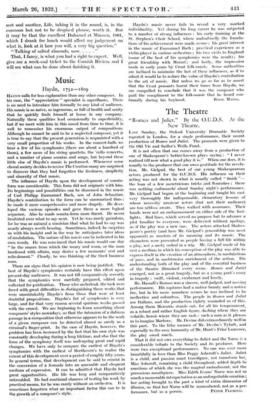The Theatre
"Romeo and Juliet." By the O.U.D.S. At the New Theatre.
LAST Sunday, the Oxford University Dramatic Society repeated in London, for a single performance, their recent production of Romeo and Juliet. The proceeds were given to the Old Vie and Sadler's Wells Fund.
It is not often that one comes away from a production of one of Shakespeare's better-known plays saying : " I never realized till now what a good play it is." When one does, it is usually to the producer that one owes gratitude for the revela- tion. Mr. Gielgud, the best of our young Shakespearean actors, produced for the O.U.D.S. His influence on their acting was not shown in what is usually called " finish "- the loan of a few meretricious tricks and flourishes : there was nothing endimanche about Sunday night's performance. Mr. Gielgud had begun at the beginning and taught his cast very thoroughly the indispensable, elementary lessons of whose necessity amateur actors (but not their audience) are too seldom aware. They walked with assurance. Their hands were not an embarrassment on either side of the foot- lights. Bad lines, which served no purpose but to advance u plot familiar to everyone, were delivered without apology, as if the play was a new one. The actors attacked Shakes- peare's poetry (and here Mr. Gielgud's generalship was most apparent) as masters of its meaning and its music. The characters were presented as people having a full life within a play, not a nasty ordeal in a wig. Mr. Gielgud made of his east a medium in which his conception of the play was able to express itself in the creation of an atmosphere, in modulations of pace, and in unobtrusive enrichment of the action. His understanding both of the play and of the essential business of the theatre illumined every scene. Romeo and Juliet emerged, not as a great tragedy, but as a young poet's essay in tragedy : swift, violent, exuberant and lovely.
Mr. Hassall's Romeo was a sincere, well-judged, and moving performance. His raptures had a native beauty and a native fire, but in his more mundane scenes he was inclined to be ineffective and colourless. The people in Romeo and Juliet are Italians, and the production rightly reminded us of this. Among them Mercutio stands out, for all his temperament. as a robust and rather English figure, dashing where they are volatile, heroic where they are rash : such a man as it pleases us to imagine Marlowe. Mr. Devine did extraordinarily well in this part. To the lithe menace of Mr. Devlin's Tybalt, and especially to the easy humanity of Mr. Hunt's Friar Laurence, the play owed much.
That it did not owe everything to Juliet and the Nurse is a considerable tribute to the Society and its producer. Here were two exceptional performances. No one was ever more beautifully in love than Miss Peggy Ashcroft's Juliet. Juliet is a child, and passion must transfigure, not transform her Miss Ashcroft, remaining a child throughout, added depth to emotions of which she was the magical embodiment, not the precocious mouthpiece. Miss Edith Evans' Nurse was not so much a memorable interpretation as an unforgettable creation ; her acting brought to the part a kind of extra dimension of illusion, so that her Nurse will be remembered, not as a per


































 Previous page
Previous page